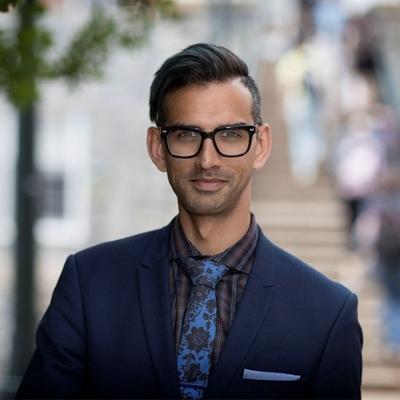Fri, 02/25/2022
In conjunction with the Rural Reconciliation Project, the Nebraska Governance and Technology Center had the pleasure of hosting Christopher Ali, Associate Professor at the University of Virginia and Benton Faculty Research Fellow at the Benton Institute for Broadband & Society, who delivered a lecture entitled “Farm Fresh Broadband: the Politics of Rural Connectivity.” Ali is the author of Media Localism: The Policies of Place, addressing the difficulties of defining and regulating local media in the 21st century in the United States, the United Kingdom, and Canada; and Local News in a Digital World: Small Market Newspaper in an Era of Digital Disruption, an intensive research project on small-market newspapers in the United States.
Ali characterized the project of delivering broadband to rural communities in the United States as one of “heartbreaks and promises.” Drawing on over 15,000 pages of textual analysis, dozens of on-the-ground interviews, and a nationwide “policy roadtrip,” Ali sought to move beyond the usual 10,000-foot policy analysis centered on legislation and regulation, focusing instead on what rural broadband policy looks like on the ground through a model he termed “Lived Policy.”
Ali described fundamental insufficiencies in the definitions and data related to rural broadband access that make a meaningful assessment of rural Americans' access to high-speed internet elusive. There remains substantial disagreement about what upload and download speeds are sufficient to qualify a connection as “broadband.” Setting that definitional issue aside, estimates of the percentage of rural Americans who lack access to broadband vary widely, with the USDA putting the percentage at 22.3, while Microsoft recently estimated that ⅓ of all Americans lack broadband access. Even the term “access” can be misleading, with the SCC defining access at the census block level, and considering all parts of the census block as having access if any part of that block could be served within 10 days. Disputes over these definitions are far from academic as they have important implications for how federal funding is allocated.
While municipalities have been finding creative ways to provide their residents with broadband access through co-ops and utilities, the SCC has historically allocated funding to what Ali called the “largest and loudest” actors — large companies that can lobby and bid on large government contracts — leaving smaller actors without federal resources. Contracts given to these large corporations have often remained unenforced, even where the corporation manifestly fails to meet the terms of its obligations.
In order to address the shortfalls of past attempts to bridge the digital divide, Ali called for what he termed a “People Centered Policy” that would have six dominant characteristics: it would be “Accountable, Local, Cooperative, Accessible, Equitable, and Inclusive.” Such a policy would work in concert with existing attempts by localities to provide their residents with high-speed access, rather than continuing the top-down approach toward the provision of broadband that has failed for so long.
Tags: Center News
